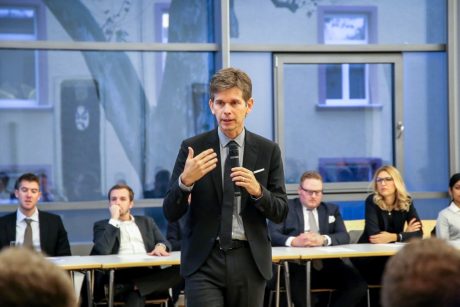„I just wanted to get out of that room,“ he said with a grin. No, this was not the complaint of a student a long day of classes, or the disgruntled mumblings of a staff member working past 5pm. They were the first words I heard from Dr. Piotr Bednarczuk on the inaugural night of Frankfurt School’s In the Boardroom lecture series for the MBA class of 2017. It was not that the former Executive Vice President of Merck was trying to find an escape route that night. Rather, having arrived early and finished settling into the room, he wanted to meet and chat with the group of students lingering in the hallway, an opportunity most of us would not have outside the doors of FS. Discussing his latest adventure of moving to London, I smiled when I heard him use the word „cool“ with an oddly familiar yet somehow foreign pronunciation. Further investigation revealed that he had grown up in Chicago, the son of Polish immigrants, and worked throughout Europe, China, and the United States. I decided then that this guy was, to use his own word, cool.

In addition to being a generally interesting person, Dr. Bednarczuk has developed an expertise in the field of human resources, making him an equally interesting professional. Having worked for many years in various corporate offices and international situations, Dr. Bednarczuk spoke to us that night regarding the imminent and strategic use of data in the development of human capital. Formerly centered on soft skills and manager preferences, modern HR departments need a priority shift to data and analytics as a tool to attract and source talent. Though initially disruptive, digitalizing the wealth of HR data–such as performance measures, employee potential ratings, movements between units, diversity, compensation, succession, and available recruitments–will allow managers to make smarter decisions, producing better business outcomes. Presenting employee data in a clear, interconnected way also increases transparency within companies and tells the story of what is occurring across departments, minimizing decisions made solely based on a manager’s opinion and highlighting problem areas. The lecture introduced a new perspective on the issues that develop when HR simply holds isolated pieces of data instead of presenting a broad overview of a business’s talent landscape.
Throughout the night, Dr. Bednarczuk paced the center of the lecture room floor asking and taking questions, keeping the event comfortable and engaging. He closed the talk by encouraging us to shift our focus from job titles to our individual functions, and to take opportunities that develop our portfolio of experiences. The advice resonated with me; after all, these were discoveries made by Dr. Bednarczuk’s looking back at the key junctures of his own successful career. Mulling things over as I walked home, I felt reassured of my decision to be a part of the MBA programme at Frankfurt School, and grateful to be a participant In the Boardroom.